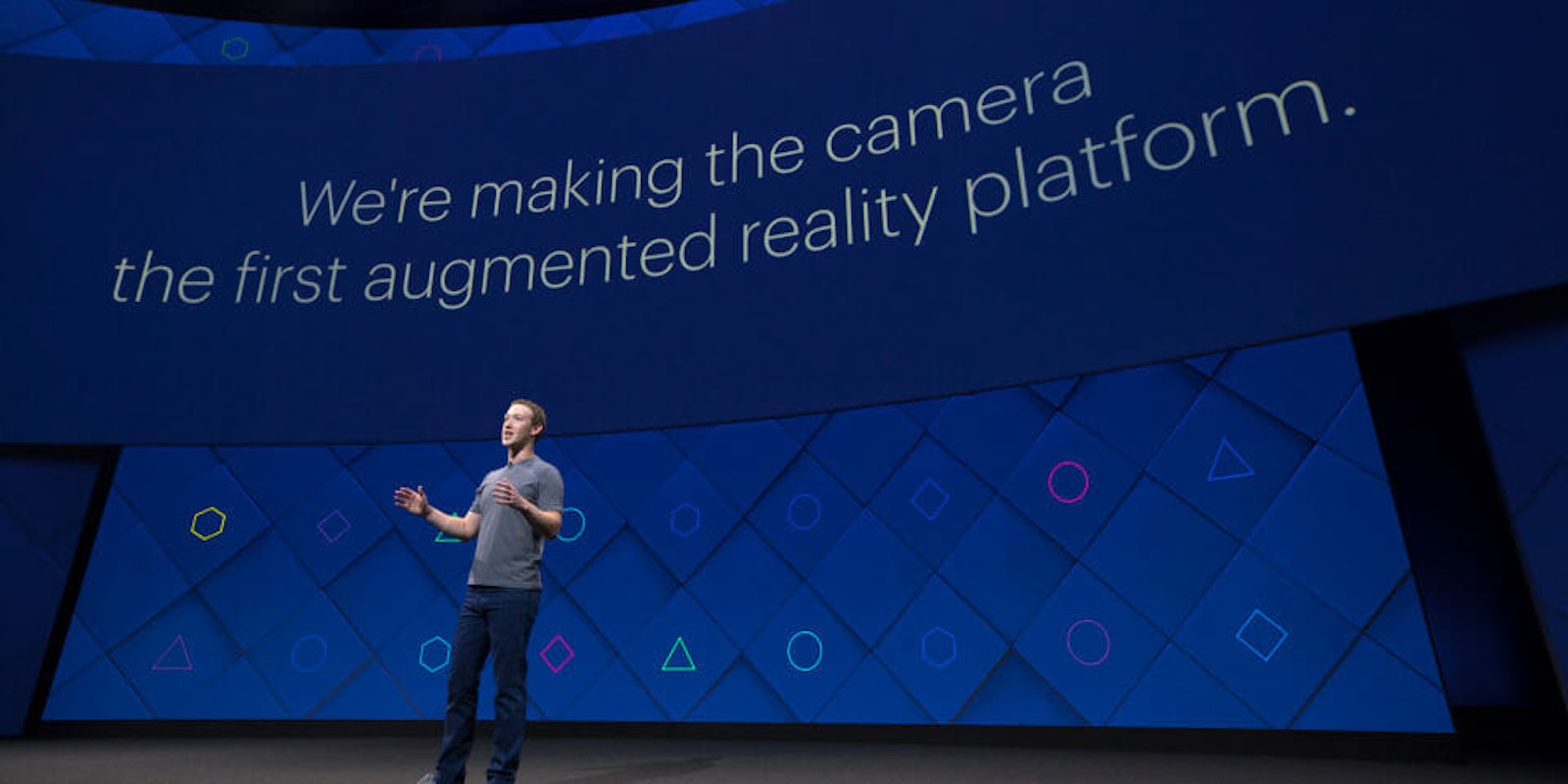Bots are so 2016. This year, Facebook is putting its focus on the big thing of 2017: augmented reality.
During the F8 developer conference keynote on Tuesday, CEO Mark Zuckerberg gave us a peek at what the coming year has in store for Facebook. The company recently introduced a camera button into all of its apps because “photos and videos are becoming more central to how we share than text,” Zuckerberg said. However, that camera is for more than just being able to snap and share pictures. Facebook plans to make the camera the first augmented reality platform.
It’s a lofty, albeit not unreasonable goal. Augmented reality has slowly been gaining traction and popularity, but its growth is fragmented. You could wear Snapchat’s $130 Spectacles for augmented reality experiences, but it’s cost prohibitive—you’ve got to buy a pair of the specs to partake. Other companies have instead focused on utilizing your smartphone’s camera for the experience (which Niantic, for example, has done to wild success with its Pokémon Go game). Each of these apps has had to largely develop their AR technologies on their own, though, which is time-consuming and inefficient. By opening up its camera as a platform, Facebook can make AR accessible to everyone—and to all developers.
Facebook isn’t the only tech giant focusing on AR, though. Apple is also reportedly devoting heavy resources into augmented reality development. While Facebook is focused on the near term, giving developers the tools to bring both fun and useful AR apps to the masses over the next year or so, Apple’s efforts may be more forward-looking and hardware-focused. Facebook thinks good quality AR glasses (that everyone would want to buy or even wear) are still a ways off.
Like its dive into the world of bots last year, Facebook presented a convincing picture of how augmented reality could improve your world. AR content will fall into one of three areas: augmenting things in the real world with additional, useful information (for example, displaying reviews and ratings on a restaurant’s storefront); inserting virtual objects into reality (turning a coffee table at the doctor’s office into a game board so you and your child can play while you wait for an appointment); and enhancing objects in your world with fun or silly effects, like a glitter beard (hey, sometimes you just need a little whimsy in your day).
Facebook offered one particular scenario that piqued my attention. Imagine, instead of needing to purchase a $500 flatscreen TV, you simply have a pair of glasses or contact lenses. When you plop on the couch, a TV screen app appears in front of you on the wall, even though there’s no TV there. You could extend this to a phone or computer screen as well. Instead of having to buy expensive physical objects, they’re all software-based projections and apps. You could potentially end up saving a lot of money on gadgetry and bring technology to more people at a fraction of the cost.
This all starts with Facebook’s Camera Effects platform, which allows developers to use three kinds of data to make these effects a reality. App makers will be able to use face tracking, information from a phone’s sensors (such as the gyroscope or your GPS location), and information from third-party apps, which developers can bring into your field of vision as needed.
To build advanced augmented reality tools, developers can sign up for access to Facebook’s new AR Studio here. AR Studio will give app makers access to object recognition and depth detection technologies Facebook has already developed. It will also let developers identify or place objects using their precise location. Facebook plans to expand things slowly, so AR Studio is a closed beta for now. However, you can soon check out two Facebook Live effects that incorporate AR Studio tools, Facebook Live: This or That and GIPHY Live.
On a more basic level, Facebook is also offering a tool called Frame Studio. Frame Studio lets you upload your own images or artwork that can be overlaid on images captured in Facebook’s apps. Anyone can submit images to Frame Studio—no programming knowledge required.
https://www.facebook.com/FacebookforDevelopers/videos/10154613896183553/
During its keynote (which you can watch in its entirety above), Facebook made a number of other announcements. Augmented reality was the focus of the day though—and a topic that will certainly grow in popularity in the coming months.


